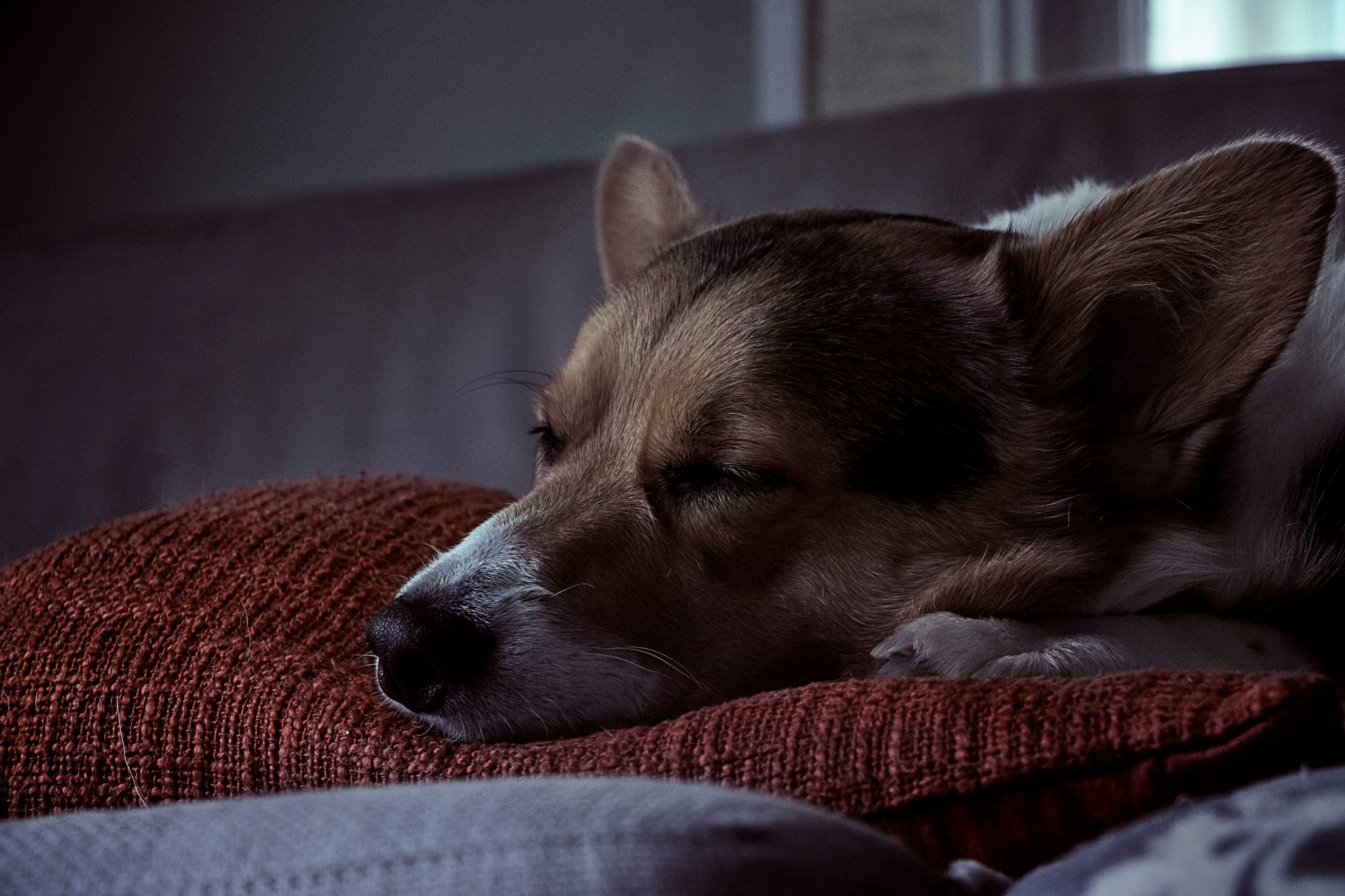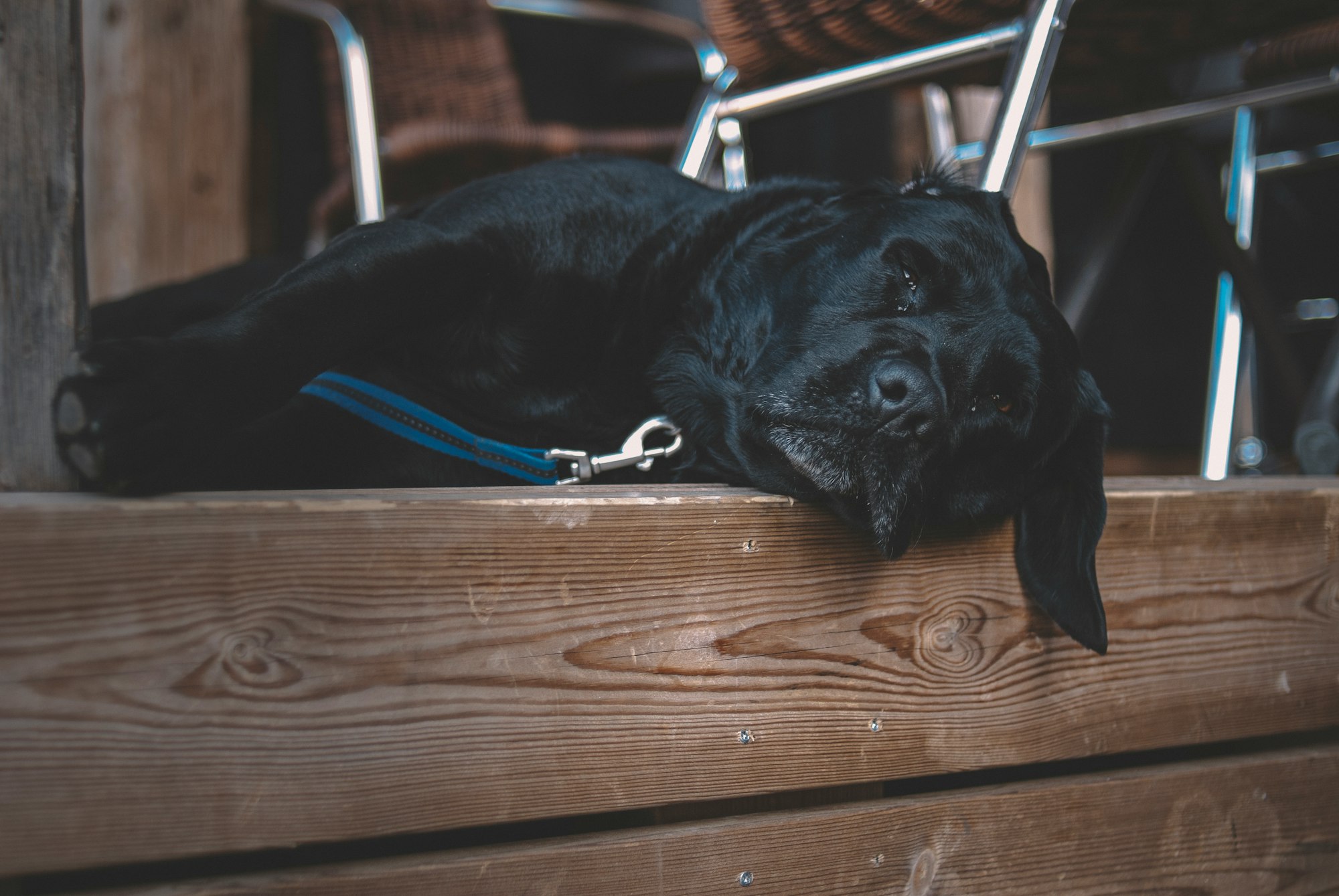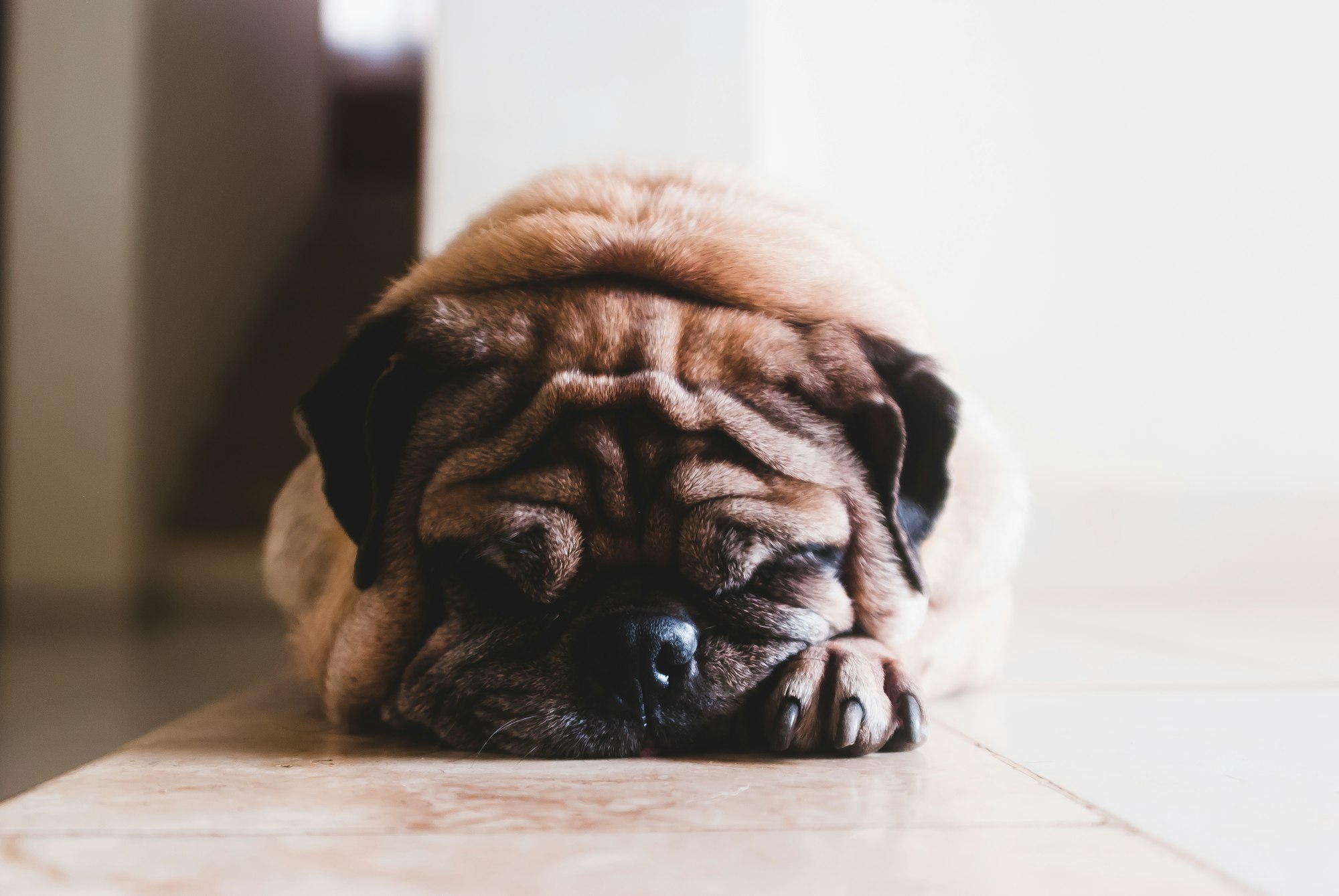Have you ever wondered how many hours your furry friend spends in dreamland? "Canine Slumber: How Many Hours Does a Dog Sleep in a Day?" is a question that intrigues many pet owners. The answer not only sheds light on their health and well-being but also helps us understand our canine companions better.

The Sleepy World of Canines
Dogs, much like humans, have a unique sleep pattern. However, their slumber is quite different from ours. On average, an adult dog sleeps about 12 to 14 hours per day. But wait, it's not just about quantity. The quality of sleep matters too!
Puppy Sleeping Habits vs. Adult Dogs
Puppies, the little bundles of joy, need more sleep than adult dogs. They can snooze for up to 18-20 hours a day. This is because growth and development happen during sleep. As dogs grow older, their sleep needs change. Senior dogs might also sleep more, but this can be due to health issues.
Understanding Dog Sleep Behavior
Dogs experience both REM (Rapid Eye Movement) and non-REM sleep. In REM sleep, dogs can dream, twitch, or even bark. Observing your dog's sleep behavior can be both amusing and informative.
Factors Affecting Canine Sleep
Several factors influence dog sleep patterns, including breed, age, activity level, and overall health. Larger breeds tend to sleep more than smaller breeds. A dog's sleep schedule can also vary depending on its daily activities and environment.
Canine Rest Requirements: More Than Just Sleep
Rest is crucial for a dog's mental and physical health. It's not just about the hours spent sleeping but also the quality of rest. Ensuring your dog has a comfortable sleeping area and a regular routine can promote better sleep habits.
The Health Implications of Dog Sleep Habits
Adequate sleep is essential for your dog's health. Lack of sleep can lead to irritability, behavioral issues, and even health problems. Paying attention to your dog's sleep and rest patterns is vital for their well-being.
In conclusion, the topic of "Canine Slumber: How Many Hours Does a Dog Sleep in a Day?" opens up a fascinating window into the lives of our four-legged friends. Understanding their sleep needs and patterns is a key part of responsible pet ownership. Remember, a well-rested dog is a happy, healthy dog!
Enhancing Your Dog's Sleep Quality
Now that we understand the importance of sleep in a dog's life, let's delve into how we can enhance their sleep quality. Creating a cozy and quiet sleeping environment is a great start. Investing in a comfortable dog bed, maintaining a consistent sleep routine, and ensuring they have a peaceful place to rest can make a big difference.

Dog Sleep Schedule: Syncing with Human Life
Many dogs adapt their sleep schedule to match that of their owners. This means they might sleep more when you're not around and be awake when you are. This adaptation showcases the deep bond between dogs and their owners and the importance of being mindful of how our routines affect our pets.
Canine Sleep Cycle: A Window into Health
Monitoring your dog's sleep cycle can be a window into their health. Sudden changes in sleeping habits can be a sign of underlying health issues. If you notice your dog is sleeping more or less than usual, or their sleep seems disturbed, it might be worth consulting a vet.
Healthy Dog Sleep: More than Just Counting Hours
It's not just about how many hours dogs sleep, but also how well they sleep. Ensuring they get enough physical activity during the day can promote better sleep at night. Balanced nutrition, regular exercise, and mental stimulation are all key components of healthy dog sleep.
The Role of Sleep in Dog Behavior
Sleep plays a crucial role in a dog's behavior. A well-rested dog is more likely to be calm, responsive, and well-behaved. Conversely, a lack of sleep can lead to irritability and behavioral issues. Understanding and respecting your dog's need for sleep is essential for a harmonious relationship.
In wrapping up, "Canine Slumber: How Many Hours Does a Dog Sleep in a Day?" is more than just a curiosity—it's a crucial aspect of canine care. By understanding and catering to our dogs' sleep needs, we can ensure they lead happy, healthy lives. Remember, the next time you see your pup curled up and drifting off, they're not just sleeping. They're recharging for more tail-wagging adventures with their favorite human—you!
The Influence of Environment on Dog Sleep
Environment plays a significant role in canine slumber. Factors like temperature, noise levels, and the comfort of their sleeping area can greatly impact the quality of a dog's sleep. Creating an environment that mimics their natural sleeping instincts, like a quiet, cozy corner, can help in providing restful sleep.
Dog Sleep Habits and Seasonal Changes
Interestingly, dogs' sleeping habits can vary with the seasons. During colder months, you might find your dog sleeping more, conserving energy to stay warm. Conversely, in the warmer months, they might be more active and spend less time snoozing. Being aware of these seasonal shifts can help you adjust their routine and environment accordingly.
The Role of Dog Sleep in Bonding
Sleep can also play a role in the bonding process between you and your pet. Dogs often choose to sleep near their owners as a sign of trust and affection. Respecting their sleeping space and occasionally joining them for a quiet nap can strengthen your bond.
Canine Sleep Disorders: When to Be Concerned
While it's normal for dogs to have varied sleeping patterns, certain signs can indicate sleep disorders. Excessive sleepiness, difficulty sleeping, or frequent night waking might require veterinary attention. Like humans, dogs can suffer from sleep disorders that affect their quality of life.
Sleep and Aging in Dogs
As dogs age, their sleep patterns may change. Older dogs often require more rest due to decreased energy levels and possible health issues. It's important to observe these changes and accommodate their comfort, perhaps with orthopedic beds or more accessible sleeping spaces.
The Impact of Diet on Dog Sleep
Diet also influences canine sleep. A balanced diet with the right nutrients can promote better sleep. Foods that are hard to digest or cause allergies may disrupt sleep, so it's vital to pay attention to what your dog eats and how it affects their slumber.

Exercise and Canine Sleep Patterns
Regular exercise is crucial for a dog's physical health and sleep quality. Adequate physical activity during the day helps regulate their sleep cycle, leading to more restful nights. However, it's important to balance exercise with rest, especially for older or health-compromised dogs.
Canine Sleep and Mental Health
Just as in humans, sleep affects a dog's mental health. A lack of quality sleep can lead to anxiety and stress in dogs. Providing a stable, comforting environment and routine can help mitigate these issues, ensuring your dog feels safe and relaxed.
The Magic of Naps in a Dog's Life
Dogs are polyphasic sleepers, meaning they have multiple periods of sleep in a 24-hour cycle. Napping throughout the day is normal and beneficial for dogs. These short bursts of sleep help them recharge, especially for active or younger dogs.
Recognizing Sleep Disturbances in Dogs
It's important to recognize signs of sleep disturbances in dogs. Restlessness, snoring, or difficulty settling down for sleep can indicate problems. If these issues persist, a consultation with a vet is advisable to rule out medical concerns.
Stress and Its Effects on Canine Sleep
Stress and anxiety can significantly impact a dog's sleep. Changes in the household, loud noises, or separation anxiety can disrupt their sleep patterns. Recognizing signs of stress and addressing them with comforting routines or consultation with a behaviorist can help restore peaceful sleep.
The Role of Regular Health Check-Ups
Regular veterinary check-ups play a crucial role in ensuring your dog's sleep health. Health issues, often unnoticed by owners, can affect sleep. Regular health assessments can catch and address these issues early, contributing to better sleep and overall health.
Sleep Training for Dogs
Just like training for behavior and tricks, dogs can be sleep trained. Establishing a consistent bedtime routine and a designated sleep area can help your dog understand when it's time to wind down and rest. This training can be particularly helpful for puppies or newly adopted dogs.
The Significance of Dreaming in Dogs
Dogs, like humans, dream during their sleep. This is most noticeable during REM sleep, where you might see twitching or hear them whimpering. Dreaming is a sign of deep, restful sleep, and it plays a crucial role in their cognitive processes.
The Connection Between Sleep and Learning in Dogs
Sleep is essential for a dog's learning and memory consolidation. A well-rested dog is more likely to perform better in training and retain new information. This highlights the importance of good sleep habits, especially in working and service dogs.
Navigating Sleep Changes in Rescue Dogs
Rescue dogs often face unique challenges in achieving restful sleep. Past traumas and environmental changes can disrupt their sleep patterns. Patience, a consistent routine, and a safe, comfortable sleeping environment can gradually help these dogs find peace and regularity in their sleep.
The Role of Comfort Items in Dog Sleep
Many dogs benefit from having comfort items, like a favorite blanket or toy, in their sleeping area. These items can provide a sense of security and familiarity, especially in unfamiliar or stressful situations, and can be a simple yet effective way to improve sleep quality.
Understanding the Link Between Sleep and Physical Activity
There's a dynamic relationship between sleep and physical activity in dogs. While adequate exercise promotes better sleep, overexertion or insufficient physical activity can adversely affect it. Finding the right balance for your dog's age, breed, and health status is key.
Seasonal Adjustments for Canine Sleep
Owners should consider seasonal adjustments to their dog's sleeping environment. Cooler bedding and more ventilated sleep areas in summer, and warm, cozy spaces in winter can make a significant difference in their comfort and sleep quality.

Advanced Age and Sleep in Dogs
In senior dogs, sleep patterns often change. They might sleep more lightly, wake up more frequently at night, or have difficulty finding a comfortable position due to joint pain or other age-related issues. Adjustments in bedding and sleeping arrangements, along with veterinary advice, can help address these changes.
The Influence of Breed on Sleep Patterns
Different breeds have varying sleep requirements and patterns. For instance, large breeds like Great Danes may need more sleep than smaller breeds. Understanding breed-specific sleep tendencies can help owners cater to their dog's specific needs.
Conclusion
In conclusion, understanding "Canine Slumber: How Many Hours Does a Dog Sleep in a Day?" reveals crucial insights into our dogs' well-being. From puppies requiring extensive sleep for growth to senior dogs with changing patterns, each stage of a dog's life presents unique sleep needs. Factors like breed, environment, diet, exercise, and mental health significantly influence their sleep quality.
Regular veterinary check-ups, understanding stress signs, and creating a comfortable sleeping environment are key. By tuning into these aspects, we ensure our dogs not only sleep well but also maintain optimal health and happiness, strengthening the bond we share with them.
FAQs:
1. How many hours a day do most dogs sleep?
- On average, adult dogs sleep about 12 to 14 hours a day, while puppies can sleep up to 18-20 hours.
2. Do older dogs sleep more than younger ones?
- Yes, senior dogs often require more sleep due to lower energy levels and potential health issues.
3. Can a dog's diet affect its sleep?
- Absolutely. A balanced diet is crucial for good sleep, while foods that are hard to digest or cause allergies may disrupt it.
4. How does exercise impact a dog's sleep?
- Adequate exercise helps regulate a dog's sleep cycle, leading to more restful nights. However, it's important to balance exercise with rest.
5. Should I be concerned if my dog's sleep patterns suddenly change?
- Yes, sudden changes in sleeping habits can be a sign of underlying health issues and might warrant a veterinary consultation.
6. Do dogs experience different sleep stages like humans?
- Yes, dogs go through REM (Rapid Eye Movement) and non-REM sleep stages, and they do dream during REM sleep.
7. How can I improve my dog's sleep quality?
- Providing a comfortable sleeping area, maintaining a consistent sleep routine, and ensuring a peaceful environment can greatly improve sleep quality.
8. Can stress affect a dog's sleep?
- Yes, stress and anxiety can significantly disrupt a dog's sleep patterns.
9. Are certain dog breeds prone to more sleep?
- Yes, larger breeds tend to sleep more than smaller breeds.
10. Is it normal for dogs to nap frequently throughout the day?
- Yes, dogs are polyphasic sleepers and napping throughout the day is normal for them.